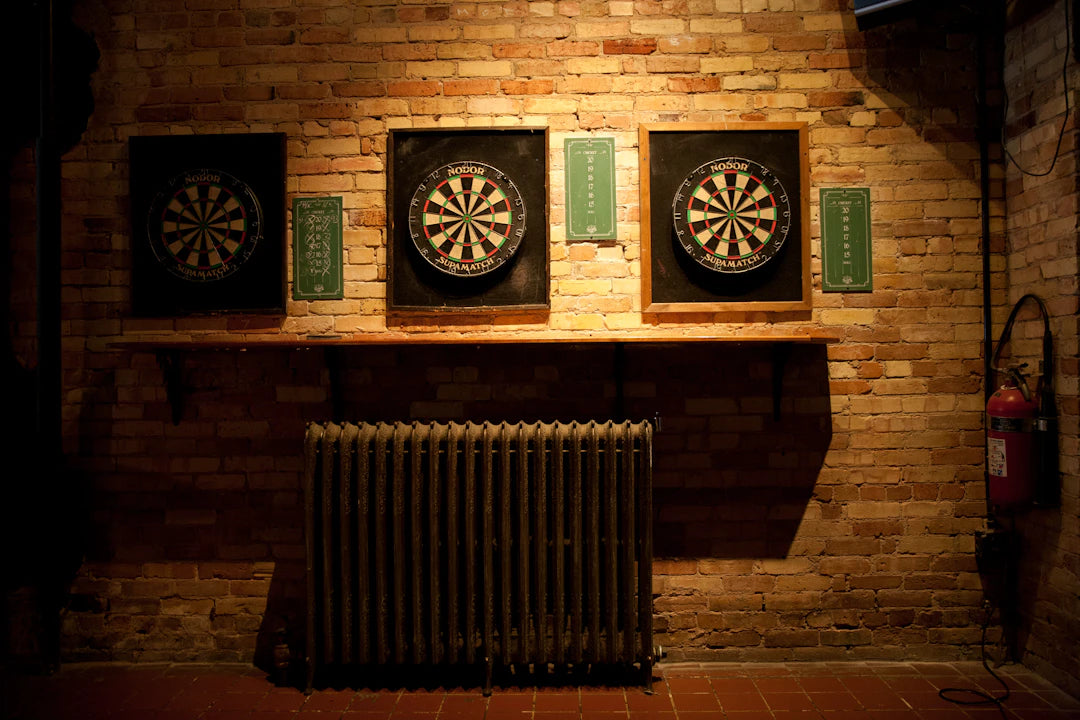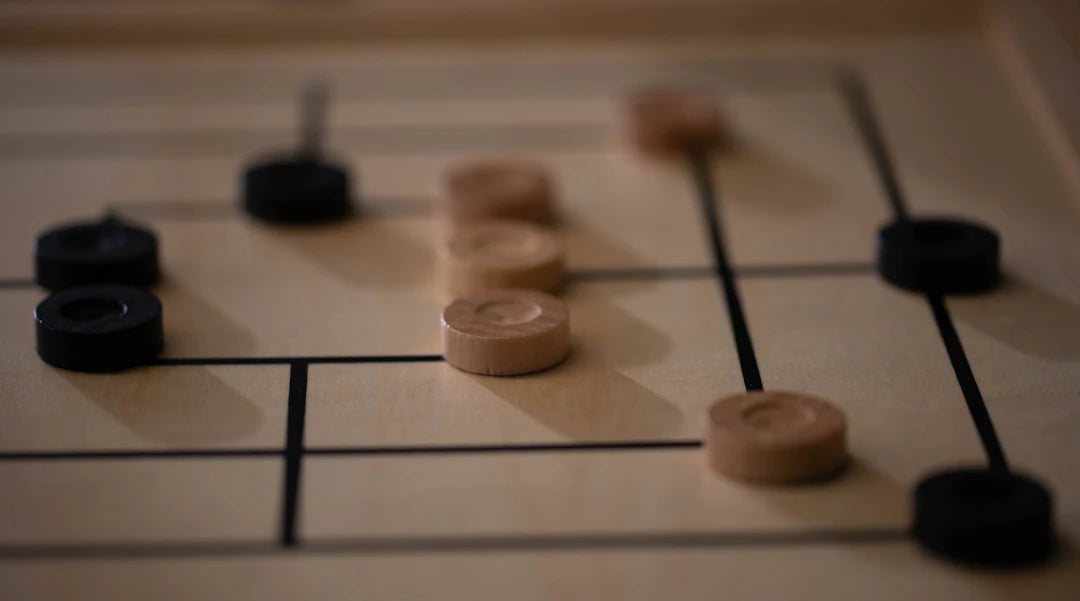Overview
This blog explores the psychological aspects of playing darts, focusing on mental strength, concentration, performance anxiety, social dynamics, and personal growth. Key topics include the importance of focus and mindfulness, coping strategies for performance anxiety, the role of community, the power of routines, and the journey of improvement through goal-setting and resilience. Emphasizing the enriching nature of darts, the article encourages players to connect with others and aim for success both in the game and in life.
Frequently Asked Questions
1. What is the main focus of the blog on darts?
2. How does focus affect dart performance?
3. What are some strategies to manage performance anxiety in darts?
4. How does the dart community contribute to a player's experience?
5. What role do routines play in improving dart performance?
Darts is more than just a game of throwing sharp objects at a board; it is a rich tapestry of psychological nuances that can direct performance and enjoyment. The dartboard serves as a striking metaphor for targets, goals, and aspirations in life, delving deep into the cognitive processes and emotional responses of players. In this engaging blog post, we will explore the psychology of playing darts by examining concentration, performance anxiety, and the social dynamics involved. Prepare to unlock the deeper meanings behind every dart thrown!
The Mental Game of Darts
As with any sport, mental strength plays an equally vital role as physical prowess in darts. Understanding the psychological factors that affect gameplay can enhance the overall experience for players and spectators alike. This section delves into two key elements: focus and mindfulness.
Focus: The Dart Player's Best Friend
Focus is the cornerstone of successful dart play. A player must tune out surrounding distractions and hone in on their target. To achieve this level of concentration, many players employ techniques such as visualization and deep-breathing exercises. These methods help the player enter a flow state—an optimal mental state characterized by complete absorption in the activity at hand.
- Visualization: Before throwing a dart, visualizing the path the dart will take can significantly improve accuracy.
- Deep Breathing: Taking deep breaths helps manage anxiety and maintain a calm demeanor.
Mindfulness: Staying Present
Mindfulness is another crucial aspect of dart psychology. Staying present and engaged during a game encourages players to enjoy the competition and avoid thoughts that lead to anxiety. Players achieve mindfulness by focusing on the moment and acknowledging their sensations, such as the feel of the dart in their hand or the sound of it hitting the board. This heightened awareness not only improves performance but also enriches the overall gaming experience.
Performance Anxiety: The Adversary of Accuracy
Performance anxiety is a common hurdle that many dart players face, regardless of their skill level. The fear of failing and the pressure to perform can lead to decreased accuracy and overall enjoyment. Recognizing the triggers of performance anxiety is essential in combating its negative effects.
Identifying Triggers
Performance anxiety can be fueled by various factors, such as a high-stakes game, competitive atmosphere, or even self-imposed expectations. Understanding these triggers can empower players to develop coping strategies that transform anxiety into a source of motivation.
- High-Stakes Matches: The pressure associated with competitive environments can lead to overthinking.
- Self-Expectations: Setting unrealistic goals often leads to disappointment when those goals are not met.
Coping Strategies
Once players identify their anxiety triggers, they can utilize practical coping strategies to maintain their performance level. Employing techniques such as positive affirmations, goal-setting, and even seeking support from fellow players can create a more relaxed experience. Positive affirmations, in particular, can help reinforce a player's mindset, altering their perception of the game from a source of pressure to a platform for expression and creativity.
Social Dynamics: The Community of Darts
Playing darts isn't solely an individual pursuit; it thrives on social interaction and community. Understanding the psychological elements involved in these dynamics can further illustrate the appeal of the game and reveal how it fosters relationships and camaraderie.
The Bonding Experience
Darts often brings people together, creating a sense of community among players. This bond can stem from friendly competition, shared experiences, and mutual support. Engaging in a game of darts allows players to blow off steam while strengthening friendships and family ties. The game's inherent structure offers opportunities for social exchange, making it enjoyable and fulfilling.
Competitive Spirit and Sportsmanship
While darts promotes camaraderie, it also nurtures a competitive spirit. Most players revel in the thrill of competition, striving to outperform each other. However, maintaining sportsmanship is vital; players must balance their ambition with respect and fairness towards others. This delicate dance enhances the overall experience of the sport, reminding players of the essential values of respect and humility.
The Routine: Rituals and Preparation
Many dart players engage in pre-throw rituals or routines that help them stay focused and prepared. These rituals can serve as anchors, aiding in managing anxiety and enhancing performance.
The Power of Routines
High-level performers often find that establishing a consistent routine boosts their confidence. Engaging in specific actions—like adjusting their stance, taking a moment to breathe, or even reciting a mantra—prior to every throw can create a sense of stability and predictability amid the uncertainties of a game.
Psychological Benefits of Routines
Implementing a routine can deliver various psychological benefits, including:
- Increased Confidence: Familiarity may enhance a player's trust in their skills.
- Stress Reduction: Engaging in a calming routine can lower anxiety levels and enhance focus.
The Drive to Improve: A Journey of Growth
For many dart players, the journey is as significant as the destination. Continuous improvement and self-discovery contribute to the appeal of the game, propelling players to chase their aspirations.
Setting Smart Goals
Understanding the importance of setting SMART (Specific, Measurable, Achievable, Relevant, Time-bound) goals can help players navigate their personal growth. By focusing on measurable outcomes, players can celebrate small wins and cultivate a sense of achievement.
Resilience Through Setbacks
Setbacks are an inevitable aspect of any sport, including darts. Experienced players recognize that failure often serves as a stepping stone to greater success. Building resilience through these challenges allows players to course-correct and adjust their techniques, improving both their performance and mental fortitude.
Harnessing the Power of Community in Darts
The darting community is a vibrant tapestry of diverse backgrounds, skill levels, and experiences. By engaging in local leagues, friendly competitions, or even online forums, players can enhance their skills and social connections. This collective environment fosters personal growth and provides an invaluable support system for players.
Building Networks and Friendships
As players connect with others in the darting community, they build friendships that often extend beyond the game. The bonds formed through shared experiences create a sense of belonging, enhancing the overall experience of being a dart player. Networking can also lead to mentorship opportunities, where more experienced players help newcomers refine their skills.
Creating Lasting Memories
Darts is a game best enjoyed with others. Many players recount unforgettable stories of friendly rivalries, celebratory moments, and hilarious mishaps that have occurred during games. These cherished memories deepen the connection between players and add richness to the sport.
Aiming for the Future
The psychology behind playing darts is a multi-faceted exploration of the mind, revealing the complex interplay of focus, anxiety, social dynamics, and improvement strategies. As players refine their skills and navigate this unique mental landscape, they develop invaluable life skills that extend far beyond the dartboard. Engaging with this understanding can lead to a more enriching experience and foster a deeper appreciation for the sport.
Incorporating the insights from this blog into your journey can enhance not only your performance but also your enjoyment of darts. Embrace the game, connect with others, and continue to aim for success—both in darts and in life!



